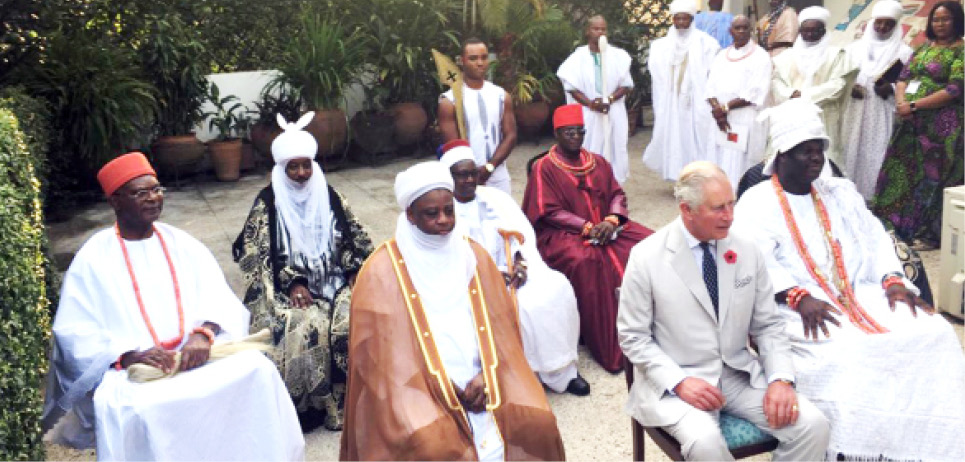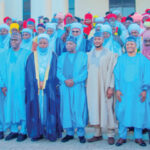PREAMBLE
Traditional institutions are the custodians of the people’s culture and traditions. They epitomise the people’s world view, sensibilities, values and essence. By virtues of their roles and responsibilities, they live with the people. In some jurisdictions, they are not only traditional and administrative leaders, they are also spiritual leaders who are highly revered for their intercessory roles between the world of the living and celestial powers. Given their strategic position, they inspire the confidence of the people and wield tremendous influence. Owing to the confidence reposed in them, their word is authoritative and easily complied with, thus making the mobilisation of their citizens towards a particular goal, seamless. Regrettably, this strategic and highly revered institution, which ought to provide a bridge between the people and government, is inexplicably excluded in the extant Constitution of the Federal Republic of Nigeria (as amended). At best, it is an institution whose status has been conveniently reduced to mere ornaments fit enough to be displayed either at public functions by governors or when august visitors are to be received.
- THE HISTORICAL ROLES OF THE TRADITIONAL INSTITUTION
The historical roles of the traditional institution varied from one jurisdiction to another. Notwithstanding such differences, there were common denominators which all traditional institutions shared. These spanned their roles as custodians of the customs and traditions of the people; providers of administrative support to the colonial government, particularly in Northern Nigeria; conflict managers; adjudicators; and law makers and implementers. In some other jurisdictions, they had the added responsibility of providing spiritual leadership to their people. Even with the advent of modern governance and democracy, the traditional institution has remained a formidable force in governance since the wider society still holds it in high esteem.
By the very structure of the traditional leadership which not only allows it to feel the pulse of the people, but also enables it to closely connect with the people and as well respond to their concerns, anxieties, frustrations, hopes and aspirations at every stratum of society, traditional institutions have always proven to be great mobilisers even at short notice.
At the apex of the traditional leadership structure are the Paramount rulers under whom there are District Heads, then the Village Heads and the Ward Heads at the lowest rung of the structure. Whereas the arrangements and nomenclatures may not be exactly the same across the country, there are indeed existing robust traditional structures that effectively function to serve the peculiarities of their people. By this very structure, traditional institutions in many of our communities are actively involved in the following:
- Academic staff union protest refusal of FCE Gusau provost to vacate office
- Democracy Day: Gov Yusuf highlights significant achievements in one year
- Dispute Resolution:
In many of our communities, traditional institutions are actively involved in dispute resolution as part of their responsibility in the local government of their areas of jurisdiction. Some of these disputes include ownership of farm lands and agricultural crops. In some instances, traditional institutions have dispensed justice faster than our law courts. Some scholars have argued that the absence of strong traditional institutions contributes to the instability and violence witnessed in some communities.
ii.Legislation:
Traditional institutions within the context of their traditional government also make some form of laws and rules which are embedded in customs and traditions. These laws and rules are usually made in consultation with their Council of Chiefs, Elders and other diverse and respected representatives of their communities. These laws and rules are revered by members of the community including those who hold political and administrative power. There are many instances when such laws and rules are used to adjudicate social, economic and other important issues impacting the community.
iii.Executive Role:
In many communities across Nigeria, Traditional Rulers are responsible for the day-to-day running of their communities. They make important pronouncements on economic activities, resources and environmental management, inter and intra-community social engagements and dispute resolution within their local communities. In some jurisdictions, traditional rulers are even recognised ahead of political office holders in order of protocol. This may not be unconnected with the fact that traditional rulers, by virtue of their mandate and calling, outlive political appointees whose appointments are tenured and short-lived.
iv.Spiritual Role:
Many of our revered traditional rulers also play important roles as spiritual leaders in their communities and over the people they rule. In some communities, traditional rulers serve as intermediaries between the people and their ancestors. It is a well-known fact that in many communities in Nigeria, traditional rulers are custodians of numerous ancestral shrines. Some of them work with fetish Priest in their Courts to fulfil these spiritual functions. Such spiritual roles enable traditional rulers to control social behaviour, curb social vices, instil vital family and community values and curb wanton exploitation of community resources with impunity.
v.Mobilisers:
Daily, governments at all levels and non-governmental organisations come up with programmes and initiatives meant to benefit communities. It is not accidental that their first port of call is often the palaces of Traditional Rulers. This is both a recognition and validation of the mobilisational capacity of the Traditional Rulers through their grassroots structures without which, such programmes and initiatives are likely to fail.
From which ever standpoint it is viewed, development is genuine and sustainable only when it focuses on the people, both as the target beneficiaries and as the drivers of the process. This finds credence in the fact that no society can help its citizens without the support of the citizens. Alienating citizens from the process of development is therefore, the surest recipe for monumental failure. To ensure success, citizens’ buy-in is crucial.
This is seamlessly guaranteed through the machinery of the Traditional Institution. They ensure that the mobilisation objectives are unambiguous and clearly understood by their subjects. They are led to see their frustrations, interests, hopes and aspirations in the goals to be achieved through the mobilisation process. This, in turn, enlists the people’s buy-in. Only the Traditional Institutions by virtue of their being an integral part of the local communities, are better positioned to guarantee this.
- HOW SUCCESSFUL THE TRADITIONAL INSTITUTION HAS BEEN
To a large extent, traditional institutions, within the context of contemporary Nigeria, have discharged their responsibilities creditably as conflict managers, administrators, spiritual heads, and custodians of the cultures and traditions of their people. When occasion arose, they have equally proven to be up to the task as great mobilisers of their people towards accomplishing noble causes. In times of crises, they have proven to be peace makers and stabilisers of the polity. They have served as a critical link between government and the citizens. At instances when there was citizen scepticism and sometimes, outright citizen resistance to well-intentioned government initiatives, it took the timely intervention of the Traditional Rulers to inspire citizen confidence in, and acceptance of such initiatives. Cases in point include their intervention when there was resistance to immunisation against polio in Northern Nigeria, the National Identity Card Registration, the national Head Count. Their intervention was also timely in dowsing tensions in crises situations. In the area of security, Traditional Rulers have provided vital and timely early warning signs on flash-points, enabling timely and appropriate government response.
- CHALLENGES
These commendable strides have not been without their fair share of odds. Foremost, is the lack of clearly defined constitutional role for traditional institutions, which limits their scope of operation, whittles their power and authority and sometimes, deflates their zeal to work. This, ironically, is against the backdrop of ever growing government and public expectations from traditional institutions to deliver.
In some jurisdictions, Traditional Rulers at the lower rung of the structure are not on government payroll, thus pauperising them and exposing them to the vagaries of mischievous and self-serving manipulators. In some other jurisdictions, the integrity and esteem of the Traditional Rulers has been so bruised such that they hardly command respect in the public eyes. In extreme cases, they have been hounded, molested, disgraced, hired and even fired by governments of the day with no justification. This has not only diminished the Traditional Institution, but has also desecrated it.
Budgetary provisions are grossly inadequate and where they are made, they are merely a paltry sum just enough for personnel cost often paid in arears of several months. This undermines the dignity of the institution, its administrative effectiveness and hampers its logistic capabilities, resulting in vast ungoverned spaces.
- JUSTIFICATION FOR CONSTITUTIONAL ROLE FOR TRADITIONAL RULERS
It remains the most accessible and closest to the citizens. That places it in a position to communicate seamlessly government policies and programmes to members of the community. It also enables them to detect early warning signs and conveniently prevent violence in their domains. Furthermore, they are able to play a great and vital role in maintaining peaceful co-existence and providing succour in their various communities during crises.
ii.Their Aptitude, Expertise and Exposure
Traditional Rulers consist of a rich pool of valuable resource. Among them are some of the best brains we have in the country drawn from a wide spectrum of professions. Most of them are well-travelled with world-wide exposure. Many are successful captains of industry that have proved their mettle in different works of life.
iii.Knowledge of the People’s Diversity
They are solidly grounded in our complex cultural and traditional diversity such that makes it possible for them to better manage our diversity with great civility.
- HOW TO MAKE TRADITIONAL INSTITUTION MORE EFFECTIVE
- Provide Constitutional Roles for the Traditional Rulers
Beyond just being repositories of the people’s customs, values and traditions, Traditional Rulers should be given clearly defined roles in the Constitutional for which they can be held accountable. As the traditional, cultural and in some jurisdictions, spiritual representatives of their people, they understand better, the sensibilities and preferences of their people and therefore, serve as the barometers through which government can feel the people’s pulse. This helps in policy formulation, review or modulation. Some areas to focus on in creating constitutional roles for the Traditional Rulers in the course of amending the Constitution should include:
a Security
Traditional Rulers should be provided constitutional roles within their domains, even if such roles are limited to civil intelligence gathering. This is particularly so by virtue of their closeness to the people, much more than even the Local Government Authorities. They know new entrants into their communities. They are also the institutions that make the most sense to the people whom they serve. This role should be sacrosanct and should not be at the whims and caprices of state Governors who are essentially and even constitutionally partisan.
- Agriculture
As a deliberate and strategic response to the existential threat to food security for a country whose population is estimated at 220 Million, there is dire need to create a constitutional role for Traditional Rulers related to enhancing agricultural development. This finds credence in the vast arable land and diverse climatic conditions we are endowed with.
- Culture and Tourism
In order to address our debilitating unemployment and poverty, it is necessary to provide specific roles for Traditional Institutions in harnessing and promoting our huge and rich cultural and tourism endowments to create employment for our people, especially the youth and women particularly in rural communities. This will help stem rural-urban drift for greener pasture.
- Environmental Sanitation
It is an incontrovertible fact that the growth and development of every society is inextricably tied to the health and well-being of its citizenry. This proceeds from the fact that the human being is the motif force of every development process. Refuse generation and disposal; drainage evacuation; open defecation; provision of public conveniences; and other related sanitation matters are all issues within the domain of one Traditional Ruler or the other. As the closest tier of government to the people, Traditional Rulers should be given the specific constitutional responsibility to superintend over environmental sanitation related matters. They should also be given constitutional powers to enforce, as well as penalise infractions.
- Adherence to Town Planning and Development Codes
In many semi-urban and rural communities, it is commonplace to observe the construction of buildings haphazardly without regard for town planning prescriptions. Streets are either narrowed or entirely blocked, making access impossible, especially in times of emergency. Where access is available, they are, at best, footpaths, hardly ever motorable.
This has security implications for life and property in the event of an emergency. It is also not only antithetical to our drive towards urban renewal, but also runs against the grain of modernity and civilise living. In most cases, transactions on lands such structures are built on, have the approval of the Traditional Ruler or his representative. Ensuring adherence to town planning regulations and development codes should be made one of the roles of Traditional Rulers in order to sanitise the process and by extension, the communities.
- Solid Minerals, Oil and Gas, and other Extractive Industry
Over the years, it has become obvious that in all communities where extractive activities take place across the countries, there have been recorded insecurity challenges. Attempts to manage such security challenges, often than not, have been left largely in the hands of security forces, whose modus operandi leans more towards kinetic responses; while ignoring the socio-economic contexts engendering such tensions and conflicts. Involvement of Traditional Rulers in the process is mostly marginal and usually when things have gone awry thus, rendering them helpless and ineffective. Ironically, so much is often expected of Traditional Rulers is such situations.
To stem this trend, Traditional Rulers should, by law, be involved in all extractive industrial activities conducted or undertaken within their domains. This arrangement, amongst other things, will help in reducing restiveness and insecurity as well as unemployment in the localities.
ii.Fund Traditional Institutions Adequately
As the administrative organ which is closest to the people, the Traditional Institution should equally be adequately funded and equipped to discharge its constitutional roles effectively. Their emoluments should come directly from the consolidated revenue of the Governments and a percentage of the revenue internally generated from the domain of the traditional rulers resulting from viable endeavours and enterprises initiated by the traditional rulers in their communities.
iii.Appointment, Suspension and Removal of Traditional Rulers
Experience has shown in not a few cases, that the Traditional Institution has suffered shame and ridicule from the whims and caprices of the political class, resulting in its being reduced to a mere pun on the chase board of politicians whose ultimate interest is to flex their political muscles and massage their ego. In order to preserve its integrity and dignity, it is necessary to insulate the Traditional Institution from the vagaries of partisanship.
Besides the security upheavals that has fuelled, sometimes degenerating in wanton loss of life and property, its effect has equally been devastating on the dignity and high esteem of the Institution which hitherto, had a chequered history of national pride and honour. Much more, the delicate fibre that holds society together is stretched to a breaking point, thus, dissolving communal cohesion.
Considering the damaging effect of partisan politics on the affairs of the Traditional Institution, appointment, suspension and removal of Traditional Rulers should not be by State Governors/Governments but their constituencies themselves dictated by their respective culture and tradition. Where however, appointments should be by the Governors/Governments, such appointments should strictly be in consonance with the customs and traditions of the people to avoid unnecessary conflict and security breaches.
iv.Build the Capacity of Traditional Rulers
To enable them discharge their constitutional responsibilities creditably, deliberate steps must be taken to build, on sustainable basis, the capacity of Traditional Rulers and their workforce in diverse areas of their mandate.
v.Resolution of Disputes
Dispute between Traditional Rulers and government or between Traditional Rulers and their subjects should be settled through the instrumentality of their cultural norms and the courts.
- PRAYER
From the foregoing, we pray that the National Assembly dispassionately considers the critical, strategic and historical place of the Traditional Institution in our governance structure, and to, as a matter of necessity, provide a definitive role for it in the 1999 Constitution of the Federal Republic of Nigeria (as amended).
FPGG …for good governance
This memo was submitted by Forum of Good Governance (FPGG)
Continue online @www.dailytrust.com

 Join Daily Trust WhatsApp Community For Quick Access To News and Happenings Around You.
Join Daily Trust WhatsApp Community For Quick Access To News and Happenings Around You.


